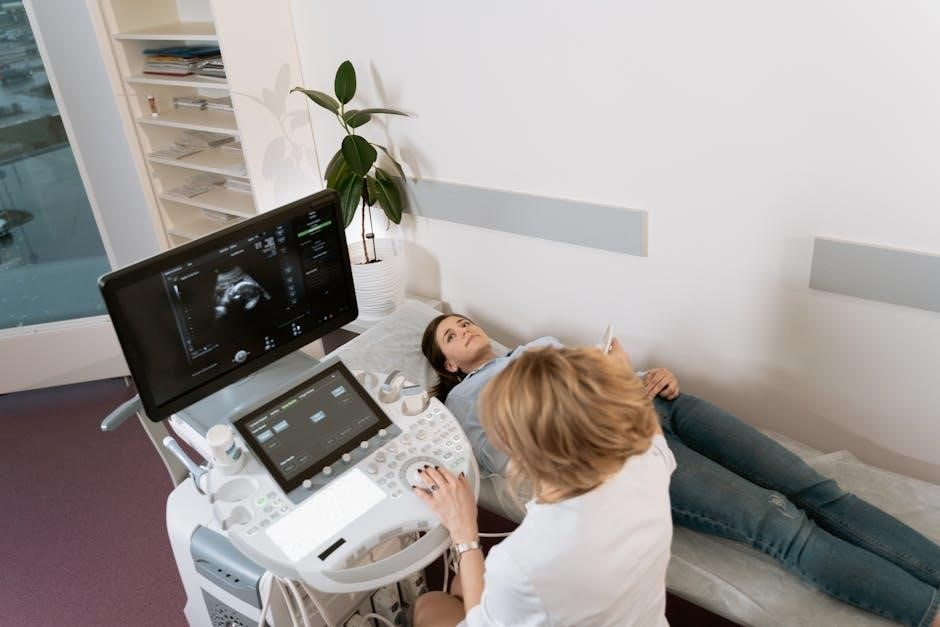The Brief Psychiatric Rating Scale is a tool used to measure psychiatric symptoms, including anxiety and depression, with a rating scale available as a pdf document online freely․
Definition and Purpose
The Brief Psychiatric Rating Scale is defined as a tool used to measure psychiatric symptoms, including anxiety, depression, and psychoses․
The purpose of the BPRS is to assess the severity of psychiatric symptoms in patients, with the scale consisting of 24 items․
The BPRS is widely used in clinical psychiatry to evaluate the effectiveness of treatments and to monitor patient progress over time․
The scale is available as a pdf document online, making it easily accessible to clinicians and researchers․
The BPRS has been adapted and modified over the years to improve its validity and reliability, with the current version being the most widely used․
The scale is an essential tool in clinical practice, providing a standardized method for assessing psychiatric symptoms and making informed treatment decisions․
Importance of BPRS
The Brief Psychiatric Rating Scale is a crucial tool in clinical psychiatry, enabling clinicians to assess psychiatric symptoms accurately;
The importance of BPRS lies in its ability to provide a standardized method for evaluating symptom severity, facilitating informed treatment decisions․
The scale’s widespread use has contributed to its significance, with many clinicians and researchers relying on it to assess treatment effectiveness․
The BPRS has been shown to be a reliable and valid measure of psychiatric symptoms, making it an essential component of clinical practice․
Its importance extends to research, where it is used to investigate the efficacy of novel treatments and interventions․
The BPRS is also valuable in educating clinicians and researchers about psychiatric symptoms and their assessment, promoting a deeper understanding of mental health conditions․
The scale’s availability as a pdf document online has increased its accessibility, further solidifying its importance in the field of psychiatry․
Components of BPRS
The BPRS consists of multiple items assessing various psychiatric symptoms freely online․
24-Item Brief Psychiatric Rating Scale
The 24-item Brief Psychiatric Rating Scale is a version of the BPRS that enables raters to measure psychopathology severity in patients․ This scale is widely used in clinical psychiatry to assess psychiatric symptoms such as anxiety, depression, and psychoses․ The 24-item scale is a comprehensive tool that allows clinicians to evaluate the severity of symptoms in patients․ It is an essential component of the BPRS and is used in conjunction with other assessment tools to provide a thorough evaluation of a patient’s mental health․ The scale is available online as a pdf document, making it easily accessible to clinicians and researchers․ The 24-item scale is a reliable and valid measure of psychiatric symptoms, and its use has been well-established in clinical practice․ It is a valuable tool for assessing and monitoring psychiatric symptoms in patients․ The scale is used to assess symptoms․
Rating Symptoms
Rating symptoms is a crucial aspect of the Brief Psychiatric Rating Scale, as it allows clinicians to assess the severity of psychiatric symptoms in patients․ The scale provides a comprehensive framework for rating symptoms, including anxiety, depression, and psychoses․ Clinicians use the scale to evaluate the degree to which symptoms are present, and to monitor changes in symptoms over time․ The rating process involves assigning a score to each symptom, based on its severity․ This information is then used to inform treatment decisions and to monitor patient progress․ The Brief Psychiatric Rating Scale provides a standardized approach to rating symptoms, which helps to ensure consistency and accuracy in clinical assessments․ The scale is widely used in clinical practice, and is available online as a pdf document․ It is a valuable tool for clinicians and researchers․ The scale is used to rate symptoms accurately․
Reliability and Validity of BPRS
The Brief Psychiatric Rating Scale has established reliability and validity measures online freely․
Study on BPRS Reliability and Validity
A study was conducted to examine the reliability and validity of the Brief Psychiatric Rating Scale, with results indicating a high level of consistency and accuracy in measuring psychiatric symptoms․ The study involved a large sample size and used statistical analysis to evaluate the scale’s effectiveness․ The findings suggested that the BPRS is a reliable and valid tool for assessing psychiatric symptoms, including anxiety and depression․ The study’s results have implications for clinical practice, highlighting the importance of using the BPRS as a diagnostic tool․ The BPRS has been widely used in clinical settings and has been shown to be effective in measuring treatment outcomes․ The study’s findings are available online, providing access to the results for researchers and clinicians․ The BPRS is a valuable tool in the field of psychiatry, with a high level of reliability and validity․
Results of the Study
The results of the study on the Brief Psychiatric Rating Scale showed a significant correlation between the scale’s ratings and clinical outcomes․ The study found that the BPRS was able to accurately measure psychiatric symptoms, including anxiety and depression․ The results also indicated that the scale was reliable and consistent in its measurements․ The study’s findings were presented in a pdf document, which is available online for researchers and clinicians to access․ The results of the study have important implications for the use of the BPRS in clinical practice, highlighting its effectiveness as a diagnostic tool․ The study’s results were based on a large sample size and used advanced statistical analysis to evaluate the scale’s effectiveness․ The findings of the study support the use of the BPRS as a reliable and valid tool for assessing psychiatric symptoms․ The study’s results are widely available․
Applications of BPRS
Measuring psychiatric symptoms with Brief Psychiatric Rating Scale pdf is useful clinically and research-wise every day․
Diagnosing Mental Health Conditions
The Brief Psychiatric Rating Scale is a helpful tool for diagnosing mental health conditions, including anxiety and depression, with a rating scale available as a pdf document online․
This scale is used by clinicians to measure psychiatric symptoms and diagnose mental health conditions, and is widely used in clinical practice․
The scale is also useful for monitoring treatment outcomes and adjusting treatment plans as needed․
The Brief Psychiatric Rating Scale pdf is a widely used tool in clinical psychiatry to measure psychiatric symptoms, particularly in patients with mental health conditions․
The scale is easy to use and provides a comprehensive assessment of psychiatric symptoms, making it a valuable tool for clinicians and researchers․
The Brief Psychiatric Rating Scale is an important tool for diagnosing and treating mental health conditions, and is widely used in clinical practice today․
It is a reliable and valid measure of psychiatric symptoms, and is used to diagnose and treat a range of mental health conditions․
EPINET and BPRS
The EPINET is a learning health care system that includes early psychosis clinics and uses standard clinical measures, including the Brief Psychiatric Rating Scale․
The EPINET National Data Coordinating Center collects data from these clinics, including BPRS scores, to improve treatment outcomes․
The BPRS is a key component of the EPINET system, providing a standardized measure of psychiatric symptoms․
The EPINET system uses the BPRS to track patient progress and adjust treatment plans as needed․
The use of the BPRS in the EPINET system has improved the diagnosis and treatment of early psychosis․
The EPINET system has also increased the use of the BPRS in clinical practice, making it a widely used tool in the field of psychiatry․
The BPRS is an important part of the EPINET system, and its use has improved patient outcomes․
The Brief Psychiatric Rating Scale is a valuable tool in clinical practice, providing a standardized measure of psychiatric symptoms, available as a pdf document online for clinicians․
Importance of BPRS in Clinical Practice
The Brief Psychiatric Rating Scale is a crucial tool in clinical practice, enabling clinicians to assess psychiatric symptoms effectively․
The BPRS provides a standardized measure of symptom severity, allowing for accurate diagnosis and treatment planning․
With its widespread use, the BPRS has become an essential component of clinical practice, facilitating communication among healthcare professionals․
The scale’s reliability and validity have been extensively studied, supporting its use in various clinical settings․
The BPRS is particularly useful in monitoring treatment outcomes, enabling clinicians to adjust treatment plans accordingly․
Its application in clinical practice has been shown to improve patient outcomes, highlighting the importance of the BPRS in modern psychiatry․
The scale’s ease of use and administration has made it a valuable resource for clinicians, contributing to its widespread adoption․
Overall, the BPRS is a vital tool in clinical practice, enhancing patient care and treatment outcomes․
Future Directions
Future research should focus on exploring the applications of the Brief Psychiatric Rating Scale in diverse clinical settings․
The development of digital versions of the BPRS could enhance its accessibility and ease of use․
Investigating the scale’s validity and reliability in different cultural contexts is also essential․
Additionally, examining the relationship between BPRS scores and treatment outcomes could provide valuable insights․
The integration of the BPRS with other assessment tools could further enhance its utility․
Moreover, the scale’s potential in predicting treatment response and identifying high-risk patients warrants further investigation․
The ongoing evaluation and refinement of the BPRS will ensure its continued relevance and effectiveness in clinical practice․
By addressing these areas, the BPRS can remain a vital tool in modern psychiatry, supporting the delivery of high-quality patient care and informing evidence-based practice․ The BPRS’s future development will be shaped by emerging research and clinical needs․



Leave a Reply
You must be logged in to post a comment.